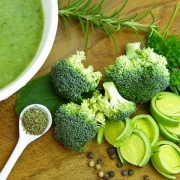5 Guidelines To Find Your Best Diet
What’s the best diet for you? There are so many diets out there. How do you know which foods are best for you. Following a few simple guidelines will take you far along the way to figuring it out.
Choose Foods As Close To Nature As Possible
As much as possible, choose foods without processing. Processed foods generally have excesses of sugar, salt, and unhealthy fats (like soy oil, canola oil, corn oil, cottonseed oil). They have preservatives, additives, artificial coloring and flavoring, and other ingredients that do not resemble real food.
Instead, choose fresh fruits and vegetables, whole grains and beans, raw unsalted nuts and seeds, and animal products that have been grown in an ethical and healthy way — pasture-fed beef and milk from those cows, pastured chicken and eggs, wild fish from unpolluted waters like the North Pacific coast of the U.S. These are the foods that make the best diet. Then you have to hone it down to which ones you need at a particular time. More of that to come.
Eat With The Seasons
Choosing produce that grows in the season we’re in will give you more nutritious, flavorful food for a lower price. Consider the wonderful taste of a juicy, red home-grown or farmer’s market tomato in the summer, vs. a pale, hard, hothouse-grown tomato that you may buy in January. The two don’t even resemble the same food!
Foods grown in season are bursting with flavor, rich in color, and full of vitality. They are also just what nature provides for the health of our bodies at a particular time of year. Watermelon, mint, and cucumbers abound in the summer, when we need cooling foods. Root veggies and winter squashes are plentiful in the cooler months, when we need more warming and grounding foods.
Pay Attention Before You Eat
If you imagine yourself eating a particular food, and then studying how you felt before and after you ate it, you will gain insights as to which foods you need to eat at that time. Even though it is all done mentally, your body will respond as if you really ate it. It’s mostly a matter of paying attention to find your best diet.
It’s also very helpful to take a few slow, deep breaths and/or say grace before you eat. It calms down the body and mind, so that you’re in a better place to digest well.
Pay Careful Attention While You Eat
Since eating is a necessity for staying alive, we might as well enjoy it. Employ all your senses in the process —
- the sight of the fool with all it’s beautiful colors and shapes
- the aromas of the food that get the digestive juices going before you even start to eat
- the feel of the foods — the textures and mouth feel that enhance the other sensory experiences
- the sounds of the food as you eat, like crunching on something crispy
- the actual tastes of the food and how they all blend together
Sometimes we don’t realize what attracts or repels us from a food. It may have nothing to do with the taste. For example, someone might enjoy ice cream because of the creamy, smooth texture. Another person might like a food because of the salty, sweet, or sour smell. It’s easier to find our best diet when we engage all our senses.
WHICH SENSE BESIDES TASTE IS THE MOST IMPORTANT TO YOU? PLEASE LEAVE YOUR ANSWER IN THE COMMENTS SECTION BELOW. I’M SO CURIOUS TO SEE WHAT PEOPLE HAVE TO SAY ABOUT THIS!
Pay Careful Attention After You Eat
By paying attention after we eat, we can see what effects the food is having on us. First, pay attention to how you feel right after you eat. Do you feel calm and sated? If you feel sleepy, you may have overeaten or eaten something that you have a food sensitivity to. It’s a clue to keep paying attention until you see a pattern.
Also attend to how you feel a few hours later, as your body is still under the influence of the foods you put in it. How is your energy level, mood, focus? All of these are influenced by what we eat.
Foods can even affect us up to 48 hours after we eat them. If something is especially agreeable or disagreeable, it will take some detective work to figure it out.
If all this is too much information, and it most likely will be, the best place to start is to choose one of the five tips and work on that alone. As you get a handle on it, you can add another tip, and later on yet another tip. This way you will understand what the best diet is for you at any given moment.
If you’ve found this information useful and would like more assistance for eating a healthier diet, contact me here for a free phone or Zoom chat. A few simple pointers can add up to big changes.










Leave a Reply
Want to join the discussion?Feel free to contribute!